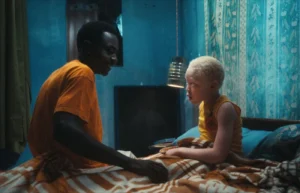Can You See Us? Asking to be seen, but not to be seen to be hurt
Albert Olatunde Oloruntoba
 From Google image
From Google image
I recently watched a 2022 Zambian movie titled: Can You See Us? directed by Kenny Mumba and co-written by Andrew Thompson and Lawrence Thompson and I felt some emotions that were not strange to me. I usually feel this way when I watch a movie that draws on the very soft emotional part of me. I mean, a story about the perception of albinism in many parts of Africa and loosely about a particular Zambian singer, it felt really close to home. Yes, I had a close family member who lived with albinism and knew how careful she was with herself. She knew she was a potential target for mischievous people and so carried herself carefully. Even taking her pictures or taking pictures with her was not a thing we could achieved that easily. “Mo ya mi”, (don’t take a picture of me) she would say until I sought her permission to do so and she agreed. Her personal experience as a person living with albinism was told to me by mama herself, but some other fragmented parts of this story I heard from family and non-family members who knew her closely. So, watching Can You See Us? was much more than watching a movie, I placed a valid face on that of the protagonist, Joseph who lives with albinism, scornfully referred to as Mwabi which means albino or ghost in Nyanja, a Zambian language. Although I will not be writing much about the events of the movie, I will tell you what some parts of the story reminded me about modern young people and in fact, people generally: their inability to accept just like everyone else, a thing and people they do not understand or that does not fit into their own limited worldview. One of the most significant statements in the movie is one made by Martin, Joseph’s adopted father when trying to encourage the now dejected Joseph: “All my life, I have been bullied by people, young and small. They’ve called me names. They even made rumours about me but you will never see me put that guitar away. Remember, what they don’t understand, they fear; what they fear, they seek to destroy”. This quotation form the backbone of Joseph’s route to survival as a child living with albinism in the environment where he is rejected. Although this statement sounds familiar to many, it comforts Joseph in times of worry and assists him to navigate the cruel world he lives in.
Now, what about the movie? Am I the only one who has seen it? I was able to link it with a trend I recently saw on the social platform TikTok. The trend, “social media will troll you” where people with different forms of disability from minor to major post their pictures and then inscribe a message along with the image: “Be ready, social media will troll you”. Despite this initial self-warning by these posters, the comment sections are always littered with disgusting demoralising messages. When people intentionally make themselves vulnerable on the social media platforms by posting themselves with their different forms of disabilities, one would expect sympathy from netzines. But that is not the case in the digital world of the Gen Zs and Alpha generation, they close the person up and vest comments that are capable of hurting hearts that are not formidable enough. In the case of Joseph of Can You See Us?, these comments even though initially caused him to wonder why he is rejected and avoided so much in the community, later fuel his desire to succeed. He learns how to play guitar, writes songs, and become a successful musician, singer, and songwriter. The depiction of the ways Joseph is treated by the people is a true reflection of our intolerant modern society, where any intentional or non-intentional attempt to be different is met with discrimination, separation, and hatred. The world wants everyone to go the same direction, even if it leads to a disaster.
Now that I have written briefly about the content of the movies, I need to touch on the technical parts of it. Beautiful shots, settings, and scenes, the movie maintains a mood that truly exudes the sombre nature of joseph’s life. There seems to be some directorial questions the story fails to pick up. Why would a healthy and active man not be able to defend himself when kids call him names? The idea behind that is unclear. Men in Africa are not handicap in anyway, in fact, they tend to be the most confident of the people. If the movie depicts him as lacking some significant socio-cultural requirements required from the people in the community, then it would be understandable. Without that, it seems his role, even though very important to the entire narrative, seems not well thought-of. Another thing is the fact that the death of Joseph’s parents are not clearly developed. It felt as though that part of the story of the character was not carefully developed. Also, as primary school children, why are young Joseph and his friend walking alone in the bush without other school pupils around there when he was abducted? As a person who lived and schooled in a similar environment, I understand that children mostly walk to and from school together. You will hardly see two primary school pupils walk alone in a lonely long bushy pathway. And if they have to apply that same method, then having school children in that same vicinity wouldn’t have caused any harm to the scene like I assume the lack of it, have. Also, acting display of some characters could have been better but special kudos to Martin, Joseph’s adopted father, little Joseph, and the oldest Joseph who ended the movie. Lastly, credit to the technical crew because, not until the end of the movie when the names of characters appear, I did not know that as a younger child, Joseph was played by a girlchild.
In the overall, this is an emotionally-charged movie, and one that speaks to the challenges that are faced by people living with albinism in Africa, challenges of invisibility and visibility, undesirability and desirability. They are not seen until they are needed, they are not needed until their uniqueness is considered beneficial to them for some diabolic reasons. It is even more touching when I discovered that it is a story based on the life of Zambia singer and songwriter, John Chiti. The moral insensitivity that has pervaded younger ones today is also importantly highlighted in the movie. Their inability to be sympathetic, let alone empathetic towards other people’s plight is now a challenge to the world. They jest off, mock off, bully, and torment people for looking or behaving differently. In a world filled with all sorts of insensitivities fostered via social media invisibility, people, especially the younger generation finds it easier to display cruelty.
If I had to rate this movie, I would rate it on two levels: content and technical posture. For content, Can You See Us? is an interestingly touching story that speaks to aspects of Africa’s socio-cultural world. For technicalities, lack of clarity in the parts I have mentioned earlier, including fragmented stores, and acting could also be better. I therefore rate is a solid 7/10.



Wow that was strange. I just wrote an extremely long comment bbut after I clicked
submkt my comment didn’t show up. Grrrr… well I’m not writing aall that
over again. Anyways, just wanted to say superb blog! https://ternopil.pp.ua/
Thank you